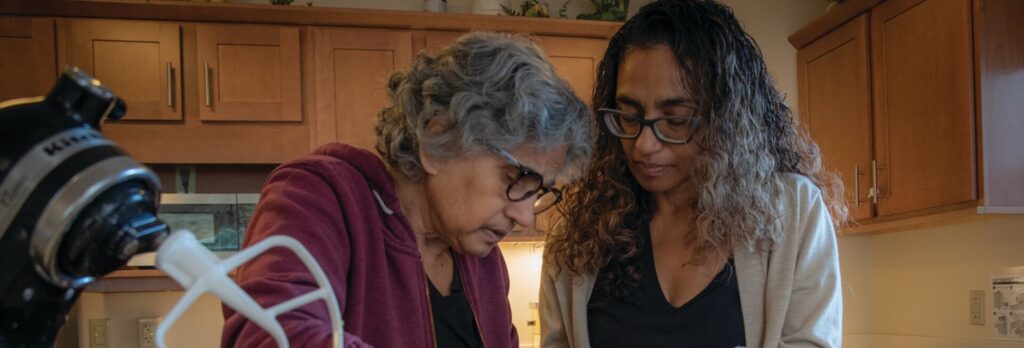
What Dementia Caregivers Need to Know
Caring for a loved one with Alzheimer’s disease or another form of dementia brings many challenges. Research shows that 59% of dementia caregivers report high emotional stress, while 38% have high physical stress. In addition, caregiving can impact social, emotional and economic well-being. While there’s no magic formula that makes caring for a person with dementia easy, there are steps a dementia caregiver can take to avoid burnout, protect their own well-being, and provide the best possible support for their loved one.
Step #1: Be Aware of Your Mindset
Cognitive therapists recognize that the way we think about challenging situations—our mindset—can affect how well we respond to them. There are empowering mindsets, such as a growth mindset (I can improve my abilities) or an opportunity mindset (challenges offer an opportunity). There are also disheartening mindsets, like a fixed mindset (my abilities can’t improve with effort) or a victim mindset (I’m powerless).
Consciously choosing an empowering mindset, in which you view caregiving challenges as an opportunity, can help sustain your optimism and energy through the caregiving journey. Give yourself frequent pep talks and remind yourself that your responsibilities are an opportunity to:
- Learn new skills
- Live your values
- Express love
- Make a difference in your loved one’s life
- Broaden your perspective
- Develop expertise
- Share meaningful experiences with your loved one with dementia
Keep in mind, an empowering mindset doesn’t mean forced optimism—sometimes called toxic positivity—which can gloss over the challenges and painful emotions that naturally arise in your role as a dementia caregiver. Rather, with the right mindset, you’ll acknowledge the potential challenges while knowing there are ways you can prepare to meet those challenges.
Step #2: Make Necessary Preparations
In stories ranging from Greek myths to movies like “The Avengers,” great challenges require a gathering of heroes. When you’re supporting a loved one with dementia, you need to assemble your own group of heroes, the people willing to share their time and knowledge with you. This support network will serve as a resource when you need a break, when you encounter a new challenge, or when you simply need an understanding listener. To assemble your support team, seek out:
- Friends and family members who have the time and inclination to offer a helping hand, or lend an ear when you need to talk.
- Medical professionals, especially those who work with your loved one and can answer questions and point you toward helpful resources.
- Support groups for dementia caregivers, where you’ll find empathy, camaraderie and helpful insights. You can find support groups through the Alzheimer’s Association.
- Educational resources, such as Artis Senior Living, where you’ll find guidance as you navigate your loved one’s care options.
Step #3: Take Appropriate Action
With a support team and educational resources in place, you’ll be better prepared to take action in a way that truly supports your loved one’s changing needs and your own needs as a caregiver. As their memory loss and cognitive decline progress, you might take appropriate action in the way you:
- Communicate. Simplifying directions, using visual cues in addition to words, making eye contact, and waiting for a response can help you communicate effectively with your loved one.
- Manage behaviors. Redirection, observing body language to learn the source of discomfort, and maintaining a predictable schedule are techniques that can reduce agitation and make daily life easier.
- Find joy in the present. Your loved one will be different, but they’re still capable of experiencing joy and satisfaction. Take time to find the joy in sharing meaningful experiences, such as taking a walk on a beautiful day or putting together a jigsaw puzzle.
- Reach out for help when necessary. There will likely come a time in the dementia journey when your family member would benefit from the specialized, 24-hour support provided in Memory Care. Finding a community like Artis Senior Living, with a compassionate, thoughtful approach to dementia care, will help ease the transition for your loved one and for you.